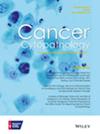The objective of this study was to elucidate the frequency and cytologic features of positive peritoneal washing cytology (PWC) in cervical gastric-type adenocarcinoma (GAS) and to clarify the clinical significance of positive PWC.
The authors analyzed cases from their institution between 1991 and 2023 in which patients underwent surgery and PWC. The study included 62 patients who had cervical GAS (1991–2023; including seven patients with adenocarcinoma in situ and 26, 15, nine, and five patients with International Federation of Gynecology and Obstetrics 2018 stage I, II, III, and IV disease, respectively) and 100 patients who had usual-type endocervical adenocarcinoma (2007–2023; including 65, 15, and 20 patients with stage I, II, and III disease, respectively). The frequency of positive PWC results and cytologic features was assessed, and correlations between positive PWC results and clinicopathologic factors were examined, including prognosis, in the GAS group.
Positive PWC results were significantly more frequent in patients who had GAS at 24% (15 of 62 patients) compared with 7% (seven of 100 patients) in those who had usual-type endocervical adenocarcinoma. The cytologic features of GAS included distinct cellular atypia (enlarged nuclei, nuclear irregularity) and frequent formation of spherical clusters (10 of 15 cases) without the golden-yellowish mucus commonly seen in cervical smears. A positive PWC result in GAS was significantly correlated with larger tumor size, parametrium invasion, lymph node metastasis, and elevated carbohydrate antigen 19-9 levels. In patients with stage I GAS, the PWC-positive group had significantly shorter disease-free survival and overall survival compared with the PWC-negative group.
Positive PWC findings are frequent in cervical GAS and are associated with pathologic factors indicative of tumor growth and progression. In patients who have stage I GAS, positive PWC results may indicate a poor prognosis, warranting further investigation.


